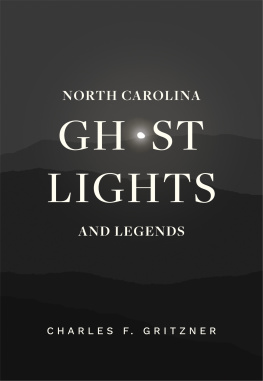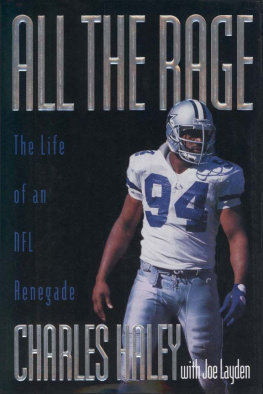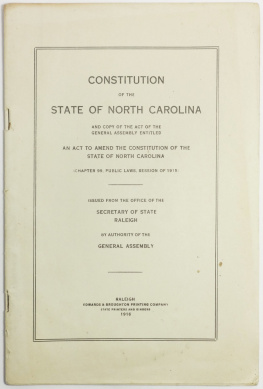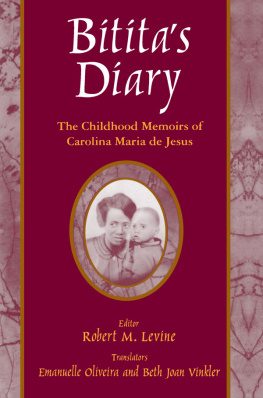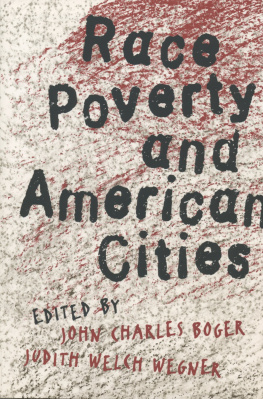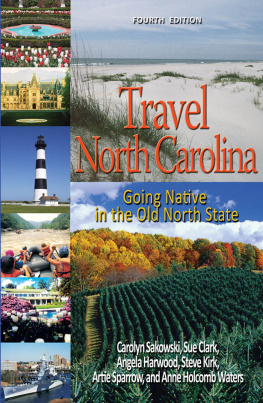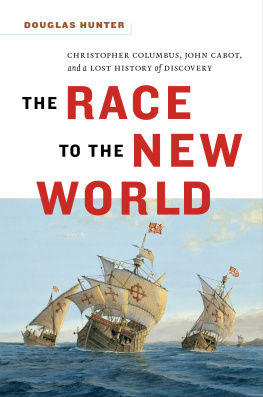1987 The University of North Carolina Press
All rights reserved
Manufactured in the United States of America
Library of Congress Cataloging-in-Publication Data
Haley, John.
Charles N. Hunter and race relations in North Carolina.
(The James Sprunt studies in history and political science; v. 60)
Bibliography: p.
Includes index.
1. Hunter, Charles N., ca. 18511931. 2. Afro-AmericansNorth CarolinaBiography. 3. SlavesNorth CarolinaBiography. 4. North CarolinaRacerelations. 5. Afro-AmericansNorth Carolina.
I. Title. II. Series.
E185.97.H84H35 1987 975.604 86-11369
ISBN 0-8078-5061-6
Designed by Chris Wilkinson
THIS BOOK WAS DIGITALLY MANUFACTURED.
Preface
At the outset of this project I intended to write a biography of the public life of Charles N. Hunter, who was born a slave and lived until the Great Depression. But as I began to place him within the context of his time and social milieu, what unfolded was a multilayered work that is also a study of race relations and black history in North Carolina. Hunter was an exceptional man if for no other reason than that he left an impressive set of papers, which contains an account of his struggle for dignity, equality, and acceptance in a society whose dominant members were committed to assigning blacks to an inferior position. During his lifetime he communicated with most of the major black personalities of his day, and he was involved in many of the important activities, organizations, and institutions that affected the black community in North Carolina. In addition to showing the frustrations and anxieties of educated and capable blacks who desperately wanted to be integrated into society as a whole and be in the mainstream of the great movements of their times, a study of Hunters life is to a degree a study of the post-Civil War history of his race in North Carolina.
Hunter also had important connections within the white community. His relationships with his former owners family and a select group of native whites frequently resulted in personal favors or support for projects that benefited his race. He was always proud of his acquaintances with a large number of the old school gentlemen of the white race, and he claimed that through all and despite all, they were his friends. Yet Hunters mentality was also shaped by forces other than his contacts with native whites. When the Civil War ended, he cast his lot with northerners, and he received his formal education and a thorough indoctrination in Republican
When Reconstruction ended without achieving real equality for blacks, Hunter began to express the idea that a satisfactory adjustment of race relations lay in an alliance with the best white men of North Carolina. He defined these men as those who had once owned slaves, and who had lived in close proximity to blacks. He saw them as men of the purest patrician strain whose social status was so firmly entrenched in southern society that they did not fear contamination by, or competition with, blacks. Neither did they need the aid of legislation to preserve their social status, and they also knew that blacks had no intentions of overstepping racial boundaries. Hunter frequently contended that Between such people and the Negro there has never been and there will never be any Negro problem.
When he was approximately sixty-three years old, Hunter wrote that his whole adult life had been devoted to promoting a better understanding and a closer cooperation between the races. In working toward these goals, he embraced almost every philosophy of race relations except separatism and violence. At times he appeared as an avid accommodationist who advised his race to sacrifice certain rights and privileges common to other American citizens in favor of those more immediate and beneficial gains that whites were willing to grant blacks. Long before Booker T. Washington achieved renown for his Atlanta Compromise speech in 1895, Hunter had publicly advocated that blacks adopt a conservative approach in race relations, and he acknowledged the greatness and the superiority of the white race on the basis of its record of achievements. He also believed that his race had to attain a high degree of intellectual development and economic self-sufficiency before it could demand civil and political equality, and he thought that progress toward these ends could be hastened if blacks devoted their energies to industrial and vocational training, cultivated good habits of thrift and morality, and remained submissive and passive to the abuses of whites.
On rare occasions, however, Hunters liberal and reforming impulses prompted him to pursue a radical philosophy of race relations, and he recommended that blacks adopt a militant program of incessant and uncompromising agitation to secure equality. His wavering stance on race relations gave him the appearance of inconsistency. But this was true of most black leaders, who were rarely frozen into either the accommodationist or the radical camp. They generally followed the most opportune course for the moment that offered the greater chance for success. Yet it also seems that Hunter was somewhat inconsistent and devious by nature. Part of this may be explained by the necessity of frequently having to alter a position on racial issues in the interest of economic security or self-protection. After making speeches or publishing articles, he was often pressured into recanting his viewpoints and explaining his motives in ways that were acceptable to whites. Nevertheless, an examination of his life also provides a much needed treatment of race relations in North Carolina during the late nineteenth and early twentieth centuries.
This is also a study in leadership styles, and although Hunter was not a leader of people, he was a leader in advancing ideas. With the exception of an occasional politician during the Reconstruction and the Fusionist eras, there were in fact few blacks in North Carolina who ever approached the status of a popular leader who commanded a large following, and who had the power to execute plans and programs. There were, however, many semiemancipated blacks, including Hunter, who led various religious, fraternal, professional, and social organizations. These men were generally torn between pursuing limited objectives to further the goals of their organizations and institutions and working to enhance their own personal status. If occasionally one came up with a plan that would benefit the masses of blacks, he was rarely able to achieve anything approaching a statewide consensus and obtain the support necessary to bring it to fruition. The majority of blacks in the state no doubt knew that these self-styled leaders were limited in their ability to produce results, and they were also aware of the fact that whites most often designated black leaders, allowed them to exist, and deposed them when they threatened the established social order.
At times Hunter and his black associates referred to themselves as leading or representative men of their race. In this they approximated the model of the Race Man or Race Leader posited by St. Clair Drake and Horace R. Cayton. The leading men in North Carolina, like the Race Man in the North, for the most part tended to oppose all attempts to subordinate their race, and they generally supported activities that would benefit blacks. They always urged their people to exercise discipline and to take maximum advantage of their educational and economic opportunities. But in an attempt to improve their race and to stimulate it to even greater achievements, these men rarely missed an opportunity to needle, cajole, and denounce blacks for their inertia, diffidence and lack of race pride.


